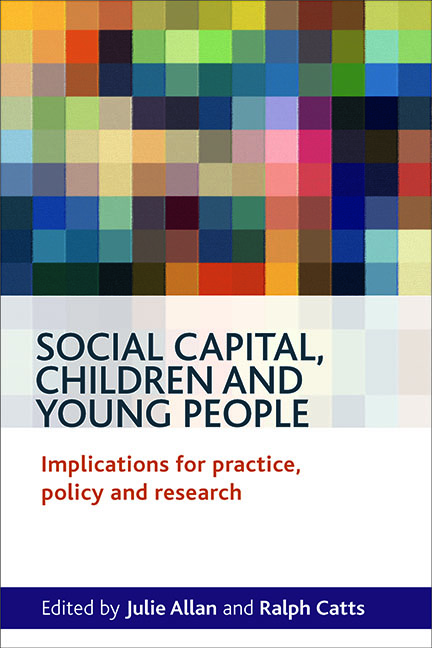one - Introduction
Published online by Cambridge University Press: 01 September 2022
Summary
This book is about young people and the ways in which their lives and experiences are shaped by social relationships, both those in which their participation is more or less obligatory, such as in families or at school, and those they establish by themselves. These relationships, and the norms and values that shape them, lead to the production of social capital:
a capability that arises from the prevalence of trust in a society or in certain parts of it … embodied in the smallest and most basic social group, the family, as well as the largest of all groups, the nation, and in all the other groups in between. (Fukuyama, 1995, p 26)
In this introductory chapter, we explore the interest in, and perceived utility of, social capital. We describe the Schools and Social Capital Network, which was established within the Applied Educational Research Scheme, a major programme of research and research capacity building, then outline each of the chapters.
Social capital: fetish or civilising influence?
The attraction to the concept of social capital by policy makers and researchers alike has been developed and sustained both by politicians as the basis for the new politics of the Third Way to address social policies (Szreter, 1999; Fine and Green, 2000) and by some academics as an important scientific tool. Fine and Green (2000) suggest that social capital has come to be seen as having a use in social discourse as a weapon to deploy in the ‘skirmishes’ (p 78) between economics and other social sciences. Paterson (2000) argues that social capital is nothing new and in Scotland is no more than the strong sense of Scottish civil society and obligation that was a feature of the eighteenth century enlightenment period. Its popularity, particularly among policy makers, has been subject to resolute criticism (Sturgess, 1997; Portes, 1998; Woolcock, 1998), yet it remains in place as something that ‘provides for (a) civilising flow of ideas’ (Fine and Green, 2000, p 91). Here we outline the specific takes of the three main proponents of social capital, identify three ‘types’ of social capital that are understood to exist and raise our own question about the assumption that social capital can be possessed – or not.
- Type
- Chapter
- Information
- Social Capital, Children and Young PeopleImplications for Practice, Policy and Research, pp. 1 - 12Publisher: Bristol University PressPrint publication year: 2012



